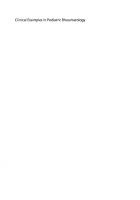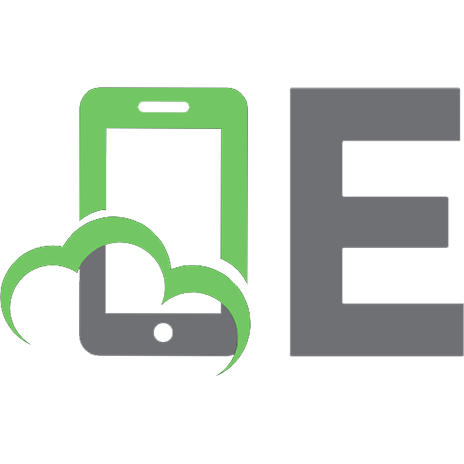C++20 in Examples. [1 ed.]
This book is about C++. It consists of examples that cover all main subjects essential for programming in C++. Chapter
283 74 3MB
English Pages 390 Year 2021
Recommend Papers
![C++20 in Examples. [1 ed.]](https://ebin.pub/img/200x200/c20-in-examples-1nbsped.jpg)
- Author / Uploaded
- Alex Vasilev
File loading please wait...
Citation preview
1
C++20 in
Examples Alex Vasilev
2
C++20 in Examples Written, codes, and illustrations by Alex Vasilev Cover image by Anastasiia Vasylieva Copyright © 2020 Alex Vasilev All rights reserved
Contents
3
Contents Introduction. The Book about С++
............................
7
About the Book
............................
7
The C++ Programming Language
............................
8
The C++ Standards
............................
9
The Software
............................
9
About the Author
............................
11
Feedback
............................
11
Downloads
............................
11
Thanks
............................
11
............................
13
The First Program
............................
13
Using Variables
............................
17
Using Functions
............................
24
Using a Loop Statement
............................
27
Using a Conditional Statement
............................
31
Using Arrays
............................
33
Chapter 2. Control Statements
............................
37
The for Loop Statement
............................
37
The do-while Statement
............................
42
The switch Statement
............................
45
Nested Conditional Statements
............................
52
Nested Loop Statements
............................
54
The Loop over a Collection
............................
58
Handling and Throwing Exceptions
............................
63
The goto Statement
............................
69
Chapter 1. Simple Programs
Contents
Chapter 3. Pointers, Arrays, and References
4
............................
71
Using Pointers
............................
71
Arrays and Pointers
............................
74
Using References
............................
78
Using Dynamic Memory
............................
80
Character Arrays
............................
83
Two-Dimensional Arrays
............................
92
Arrays of Pointers
............................
99
Chapter 4. Functions
............................ 107
Using Functions
............................ 107
Overloading Functions
............................ 112
Default Values for Arguments
............................ 116
Using Recursion
............................ 119
Passing Arguments to Functions
............................ 122
Passing Pointers to Functions
............................ 126
Passing Arrays to Functions
............................ 129
Passing a String to a Function
............................ 136
A Pointer as the Result of a Function
............................ 139
A Reference as the Result of a Function
............................ 143
A Dynamic Array as the Result of a Function ............................ 146 Pointers to Functions
............................ 152
Static Local Variables
............................ 158
Lambda Functions
............................ 161
Chapter 5. Classes and Objects
............................ 169
Using Classes and Objects
............................ 169
Public and Private Members
............................ 174
Overloading Methods
............................ 177
Constructors and Destructors
............................ 183
Contents
5
Operator Overloading
............................ 191
Comparing Objects
............................ 203
Using Inheritance
............................ 209
Chapter 6. Using Object-Oriented Programming
............................ 219
A Pointer to an Object
............................ 219
Arrays of Objects
............................ 228
An Array as a Field
............................ 232
Functors and Object Indexing
............................ 238
The Copy Constructor
............................ 242
Inheritance and Private Members
............................ 247
Virtual Methods and Inheritance
............................ 250
Multiple Inheritance
............................ 254
Base Class Variables
............................ 257
Chapter 7. Template Functions and Classes
............................ 263
Template Functions
............................ 263
Template Functions with Several Parameters
............................ 268
Overloading Template Functions
............................ 271
The Explicit Specialization of Template Functions
............................ 273
Template Classes
............................ 275
The Explicit Specialization of Template Classes
............................ 278
Default Values for Template Parameters
............................ 284
Automatically Calculated Parameters
............................ 286
Inheritance of Template Classes
............................ 288
Integer Template Parameters
............................ 294
Template Lambda Functions
............................ 306
Contents
Chapter 8. Different Programs
6
............................ 309
Using Structures
............................ 309
Template Structures
............................ 312
Complex Numbers
............................ 314
Numerical Arrays
............................ 319
Dynamic Arrays
............................ 331
Using Sets
............................ 337
Associative Containers
............................ 341
Enumerations
............................ 345
Handling Exceptions
............................ 348
Using Multithreading
............................ 350
Chapter 9. Mathematical Problems
............................ 357
The Fixed-Point Iteration Method
............................ 357
The Bisection Method
............................ 360
Newton's Method
............................ 366
The Lagrange Interpolation Polynomial
............................ 368
The Newton Interpolation Polynomial
............................ 372
Simpson's Method for Calculating Integrals
............................ 377
The Monte Carlo Method for Calculating Integrals
............................ 380
Euler's Method for Solving Differential Equations
............................ 383
The Classical Runge-Kutta Method
............................ 386
Conclusion. Some Advice
............................ 389
Introduction
The Book about С++
7
Introduction
The Book about С++ You can observe a lot by watching. Yogi Berra
This book is about the C++ programming language. If you have no (or little) experience in C++, if you want to succeed in programming in C++, and if you are ready to study hard, then the book is for you.
About the Book The book consists of specially selected examples and problems. They cover all main subjects essential for programming in C++. The first chapter gives a general notion of what we can do in C++. There we learn how to create a program. The chapter also contains information about input and output operators, variables, functions, loop statements, conditional statements, and arrays. The second chapter is devoted to the control statements. In this chapter, we consider in detail the conditional statement, loop statements, the selection statement. We also will get a notion about handling and throwing exceptions. In the third chapter, we discuss pointers, arrays, and references. Namely, we consider how to create and use pointers. We discuss the relationship between pointers and arrays, and also we investigate how and when we can use references. Moreover, the chapter contains information about memory allocation. As well, there we analyze the peculiarities of character arrays used to implement strings. The fourth chapter is about functions. There we learn what a function can do and how we can use it. We overload functions, define the arguments with default values, and use recursion. We will get to know how arguments are
Introduction
The Book about С++
8
passed to functions and how we pass a function as an argument. Also, we learn how functions operate with arrays, references, and pointers. In the fifth chapter, we discuss the principles of object-oriented programming. We learn how to describe classes and create objects. Also, the chapter contains information about public and private members, constructors and destructors, overloading methods and operators, using inheritance. In the sixth chapter, we continue discussing classes and objects. Namely, we get familiar with pointers to objects, arrays of objects, and functors. We will use objects whose fields are arrays and implement object indexing. We will get familiar with virtual methods and multiple inheritance, and do some other tricks with classes and objects. In the seventh chapter, we investigate template functions and classes. There we create and overload template functions with several parameters. We will come to know how to define default values for template parameters. There we also apply inheritance for template classes. Moreover, in the chapter, we consider how to use integer template parameters. In the eighth chapter, we consider different programs. The chapter explains how to use structures, complex numbers, and containers. We will also get familiar with multithreading. The ninth chapter is devoted to mathematical problems. In that chapter, we show how to implement methods for solving algebraic and differential equations, calculate integrals, and create interpolation polynomials.
The C++ Programming Language By now, C++ is one of the most popular programming languages. It is impossible to imagine a professional programmer who would not know C++. In this sense, choosing C++ for studying seems to be very reasonable. In addition to the direct benefits of having the ability to create programs in C++, there is also an important methodological aspect. It is based on exceptional
Introduction
The Book about С++
9
flexibility and richness of the C ++ language. After having studied C++, it is much more comfortable "to adopt" other programming languages. But, in any case, C++ is a "must-know" language, and it will be in the nearest future. No doubt, C++ is an excellent choice to get familiar with programming.
The C++ Standards The C++ language was created as an extension of the C language in 1983. Since that time, several Standards of the C++ language were developed and approved. Those Standards are C++98, C++11, C++14, C++17, and C++20 (the number stands for the year the Standard was approved). Each Standard makes more or less essential improvements to the language and sometimes discards inefficient features. Notes To get information about which Standards are supported by compilers, you can visit
the
https://en.cppreference.com/w/cpp/compiler_support. In the book, we will consider the most general and universal peculiarities of C++. So most programs from the book can be compiled by modern compilers. Nevertheless, there are also codes based on using the compilers that support C++20 Standard.
C++20 Standard
When it is crucial to use a compiler supporting C++20 Standard, we make special notes and explain what is essential and how it can be handled.
The Software In the book, we will consider a lot of different programs. It's a good idea to study how they operate. But for a more in-depth understanding, it would be good to run the programs by yourself. For doing that, it is necessary to have the proper software.
Introduction
The Book about С++
10
At least, you should have a compiler, which is a special program that translates the code you created to the statements the computer executes. There are a lot of compilers suitable for solving the task. One of the most popular is the GNU compiler that can be reached at the https://gcc.gnu.org/. To create a program, you should write its code within a code editor (anyone is good, even Notepad), save the file with the .cpp extension, and then compile it. Suppose we have the program.cpp file with the program code. Then to compile the program with the GNU compiler, we can use the following instruction in the command line: g++ program.cpp -o program
If the compilation is successful, then the executable file program.exe will be created. To run the program, we should run the program.exe file. Details
In Linux, you can use the same instruction g++ program.cpp -
o program to compile the program. The name program after the o parameter defines the name of the executable file. If omitted, the executable file gets the name a. The instruction g++ --version gives information about the version o the GNU compiler installed on your system.
It is also a good idea to use Microsoft Visual Studio for creating programs, compiling and running them. In that case, all you need to do is to install Visual Studion and get familiar with its main features. Notes There is no lack of software for creating programs in C++. Now, a lot of highquality software development tools exist, both commercial and free. As usual, an integrated development environment is used, which binds a code editor, debugger, compiler (not always, but very often), and some other additional utilities. Of course, you are free to choose any development environment you
Introduction
The Book about С++
11
want. If so, refer to the manual for the compiler you use to clear out how to compile a program.
About the Author The author of the book, Alex Vasilev, is a Professor in Theoretical Physics at the Physics Department of Kiev University. He teaches programming in C++, C#, Java, JavaScript, and Python for more than fifteen years. Research interests are physics of liquids and liquid crystals, biophysics, synergetic, mathematical methods in economics, modeling of social and political processes, mathematical linguistics.
Feedback You can send your comments and suggestions about the book by email [email protected].
Downloads You
can
download
the
codes
from
the
book
at
www.vasilev.com.ua/books/cpp/codes.zip.
Thanks I express my sincere gratitude to the readers for their interest in the book and hope that the book will help in studying C++.
Introduction
The Book about С++
12
Chapter 1
Simple Programs
13
Chapter 1
Simple Programs Activity is the only road to knowledge. George Bernard Shaw
In this chapter, we will learn how to create programs in C++, get data from the keyboard, and print to the console. We also will use variables, perform some arithmetic operations, and make other useful things. So let's begin.
The First Program Our first program prints a message on the screen. Its code is in Listing 1.1.
Listing 1.1. The first program #include using namespace std; int main(){ // Prints a message: cout







